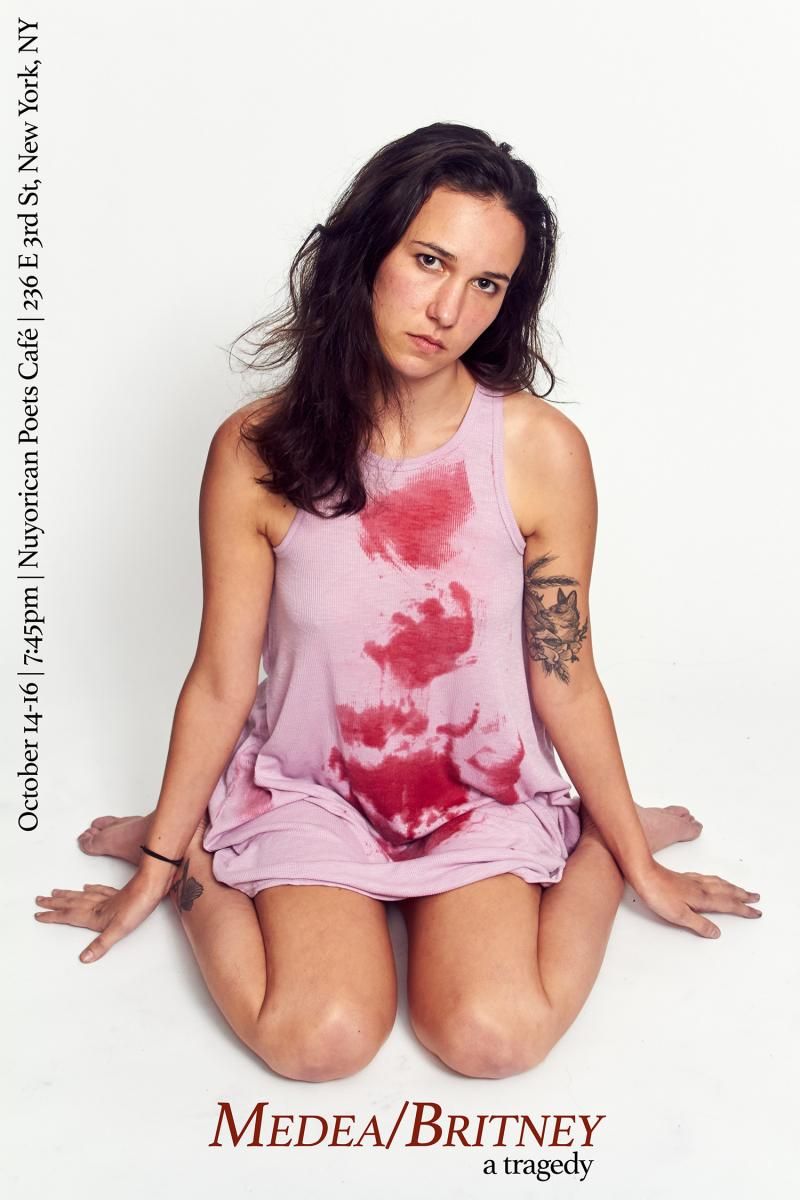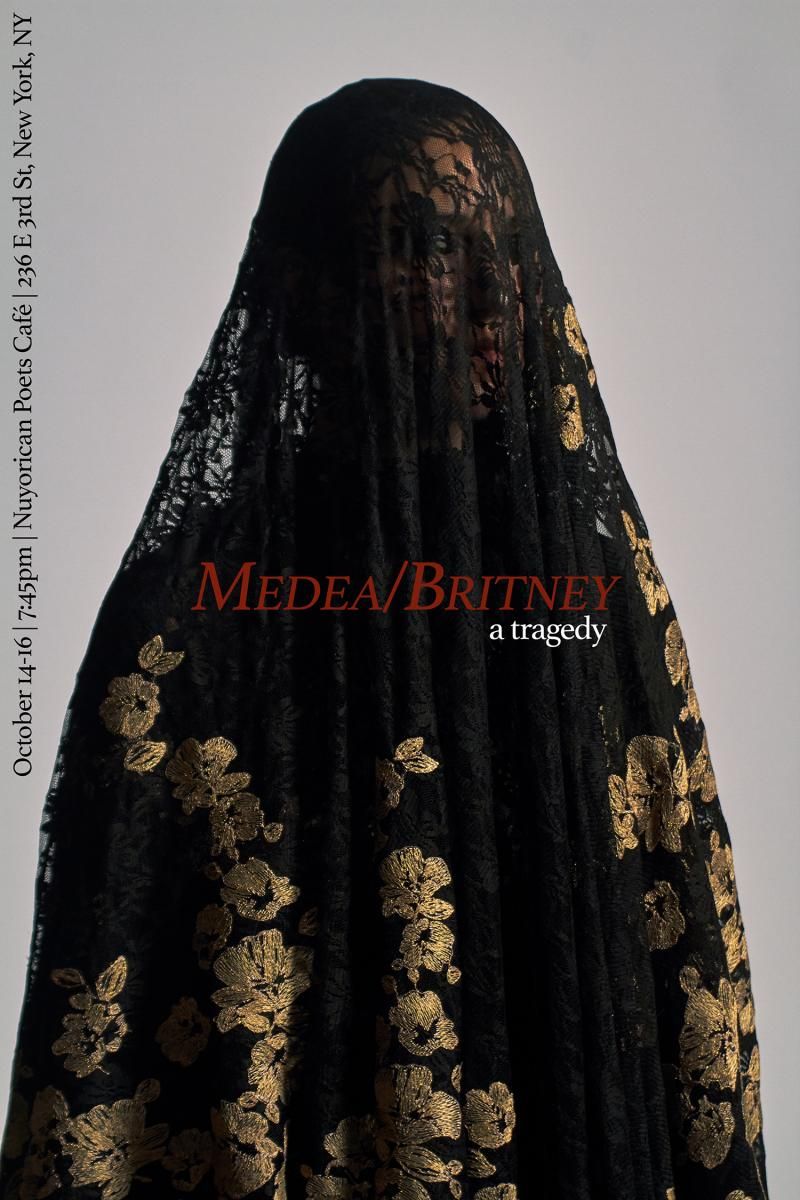Interview: James Clements Discusses MEDEA/BRITNEY
 James Clements is an artist of many talents, fearlessly tackling the issues through art. His latest piece, developed with Sophia Frank, is MEDEA/BRITNEY.
James Clements is an artist of many talents, fearlessly tackling the issues through art. His latest piece, developed with Sophia Frank, is MEDEA/BRITNEY.
The multi-media piece juxtaposes the story of Medea with the tragedy and public consumption of Britney Spears. Weaving together Medea, MEDEAPLAY by Heiner Muller, and Vanessa
Grigoriadis' Rolling Stone article on Britney Spears, the performance explores the idea of proper femininity, the performative properties of public female bodies and the mythology of motherhood.
We took a moment to speak with Clements about the upcoming show, see what he had to say about how it's all coming together!
What inspired MEDEA/BRITNEY and how did it come to be?
Myself and Sophia Frank, my co-conceiver, both studied at NYU Tisch at the Experimental Theatre Wing where the director Kate Whoriskey, who subsequently became a mentor of mine, taught a directing class. The pieces she brought in for us to work with were Medea by Euripedes and MEDEAPLAY by Heiner Muller. This piece was an in-class project that grew a life of its own.
Meanwhile we grew up with Britney Spears, her first single came out when I was 5 or 6 years old, so for my sister and I that was the first album we would force our parents to listen to in the car. It was really seminal. The period that the play focuses on in her life, one of great difficulty, was also seminal for me and Sophia because we were young adults, teenagers, I feel it's evolved as part of our consciousness. I had read that article in Rolling Stone at the time and was struck by how beautiful and moving it was and I saw a really clear parallel at least in my mind.
It's not an immediate association one might make but it does make a strange sort of sense.
What's been so strange is that the text is a mix of text I've written, text of Medea, MEDEAPLAY, and actual chunks of text from the article, and it's crazy for me as a writer/director to be with such a wonderful performer as Sophia and hearing it because where the Medea text ends and the Rolling Stone text begins, it really could be one story.
This moment Britney Spears where she locked herself in the bathroom with her child, we're not making theatre that advocates for killing your children, but as much as we as audience members are encouraged to empathize with Medea and as much as Medea is actually redeemed in the text for an act that we think of as so unthinkable, we were curious how Britney Spears's decision to open the bathroom door and hand her children over and do the right, responsible thing has led to what we perceive as a different type of punishment.
One thing I think ties both stories together is how they speak to the pressure on women as mothers in a way that it maybe doesn't exist as much or is less enforced on men as fathers and the idea that there's nothing worse that a woman can do than be a bad mother. I think that in itself is a really troubling double-standard in our society that women are held to this idea of motherhood in a way that men are not in a way to fatherhood.
In what ways has the piece changed and developed over the years to get to its current version?
I hope that with Sophia and me going from being 20 year-old college kids who didn't know anything to slightly older, hopefully more professional folks, it's matured. It's become less literal. In Kate's class she was always encouraging us to be bold and be brave. She told us the audience is smart, so she doesn't necessarily need to look like Britney Spears. I think what we've tried to do to this production is distill it down to what is really necessary and commit to the idea that we are telling the story of Medea through this period of Britney Spears's life in the same way you might set Swan Lake in Soviet Russia.
%20James%20Clements%2C%20Sophia%20Frank%20and%20Pablo%20Calde%CC%81ron-Santiago.jpeg) I think that we've become more confident in ourselves as artists and clearer in what we're trying to communicate. With the addition of Pablo Calderón-Santiago, who my company has worked with for years, as the visual designer of the piece and Jack Scaletta as the lighting designer, we've expanded it. It's gone from being me and Sophia's secret baby to something we've opened up by bringing in other voices. It's deepened and become more complex and less easy access. We've removed things that felt extraneous or indulgent and really tried to hone in on the emotional arc of this person in this moment in her life.
I think that we've become more confident in ourselves as artists and clearer in what we're trying to communicate. With the addition of Pablo Calderón-Santiago, who my company has worked with for years, as the visual designer of the piece and Jack Scaletta as the lighting designer, we've expanded it. It's gone from being me and Sophia's secret baby to something we've opened up by bringing in other voices. It's deepened and become more complex and less easy access. We've removed things that felt extraneous or indulgent and really tried to hone in on the emotional arc of this person in this moment in her life.
I hope it's not disrespectful. We're not trying to be. This isn't a joke. This isn't about how "crazy" Britney Spears was in those years. I think it's easy to think that the world is kind of a dumpster fire right now. Looking at how that time in Britney Spears's life was treated by the media and by us as consumers or as audiences you look back at those headlines and it's awful. I think something that has changed for the better is our engagement with mental health and agency and I think that that is something else I hope this piece does is slightly give that time in Britney's life another look in light of what we have finally started to learn as a society about empathy and the complexities of human beings. The last thing we wanted to do was be reductive or tongue in cheek so that's what I mean by simplifying and really getting to the emotional core and making sure that there's nothing in it that feels gimmicky or that feels, for want of a better word, tacky, or exploitative.
How is the piece formatted?
Sophia is a total powerhouse she's been living with this character on and off for six years and we've produced it in school, developed it further in school, then produced it in 2015, and in this iteration it's still just Sophia, it's a one person show. I don't know how she does it, it takes a lot of energy to go through Medea's emotional arc. This is a workshop production, only around 30 minutes, but it follows Medea. There's a prologue, we see her speak with Jason, we see her decision to kill her children, we see her killing them, then we see her being elevated by the gods on her chariot. That's the literal arc of Medea that we're being faithful to. We obviously massively cut the text of Medea down, removed the other characters, let it really focus on Medea. But in terms of the narrative it's all set in the bathroom during the three hours in January 2008.
Where the other elements interplay is juxtaposed against the Medea narrative. We have voice overs from the article or we have clips of the real Britney Spears almost like a Greek chorus, which we think is kind of a cool, hopefully exciting look at what dramatic functions of Greek Shakespearean theatre can be in the modern age. Audiences can understand things on two separate planes. Sophia is literally on stage going through the arc of Medea's character and then the multimedia elements are bringing in the Britney Spears content and our modern content.
 It's pretty intense. It's really heavy material. That would also be a change for us approaching this piece now, our maturity as artists. We have friends who have children, we have friends who have gone through difficult times with their mental health, we have gone through difficult times with our mental health. It's a difference of perspective from being a 20 year-old college kid. It hits a little deeper for us now and I hope that's there in the piece.
It's pretty intense. It's really heavy material. That would also be a change for us approaching this piece now, our maturity as artists. We have friends who have children, we have friends who have gone through difficult times with their mental health, we have gone through difficult times with our mental health. It's a difference of perspective from being a 20 year-old college kid. It hits a little deeper for us now and I hope that's there in the piece.
Any final thoughts?
I hope when people see it they reassess Britney Spears because this conservatorship she's under is still ongoing now ten years later, and I think that it's a form of punishment or control, that is my opinion, and I do think that it needs to be discussed. This show is really going to be something special I think. I'm excited to be at NYC Fringe, it's my first time working with the Fringe. It's the perfect incubator for new work at this stage in its existence. We're trying to work out next steps and I think this is a beautiful chance to show off what we've been cooking.
MEDEA/BRITNEY runs October 14th-16th at Nuyorican Poets Café as part of FringeClub alongside New York City Fringe's 2019 BYOV festival. For tickets and more information, click here.
Videos

